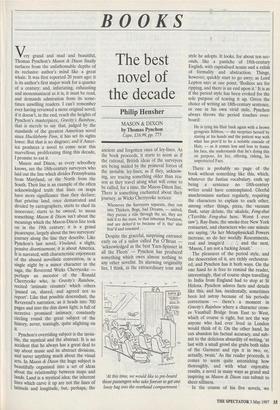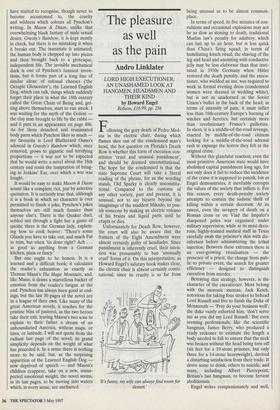BOOKS
The best novel of the decade
Philip Hensher
MASON & DIXON by Thomas Pynchon Cape, £16.99, pp. 773 Very grand and mad and beautiful, Thomas Pynchon's Mason & Dixon finally surfaces from the unfathomable depths of its reclusive author's mind like a great whale. It was first reported 20 years ago; it is its author's first major work for a quarter of a century; and, infuriating, exhausting and monomaniacal as it is, it must be read, and demands admiration from its some- times unwilling readers. I can't remember ever having reviewed a more original novel; if it doesn't, in the end, reach the heights of Pynchon's masterpiece, Gravity's Rainbow, that is merely to say that, judged by the standards of the greatest American novel since Huckleberry Finn, it has set its sights lower. But that is no disgrace; and if Amer- ica produces a novel to come near this marvellous, proliferating thing this decade, I promise to eat it.
Mason and Dixon, as every schoolboy knows, are the 18th-century surveyors who laid out the line which divides Pennsylvania from Maryland, or the North from the South. Their line is an example of the often acknowledged truth that lines on maps have more significance than they declare; that pristine land, once demarcated and divided by cartographers, starts to shed its innocence, starts to be owned, to mean something. Mason & Dixon isn't about the meanings which the Mason-Dixon line took on in the 19th century; it is a grand picaresque, largely about the two surveyors' journey along the line they describe. Like Pynchon's last novel, Vineland, a slight, pensive divertissement, it is about America. It is narrated, with characteristic enjoyment of the absurd novelistic convention, in a single night by a minor character in the saga, the Reverend Wicks Cherrycoke perhaps an ancestor of the Ronald Cherrycoke who, in Gravity's Rainbow, recited 'intimate résumés' which others `passed on, shared, and agreed not to report'. Like that possible descendant, the Reverend's narration, as it heads into 700 pages and into the dim dawn light, is full of secretive promised intimacy, constantly circling round the great subject of the history, never, teasingly, quite alighting on it.
Pynchon's overriding subject is the invisi- ble, the mystical and the abstract. It is no accident that he always has a great deal to say about music and its abstract divisions, and never anything much about the visual arts. In Mason & Dixon the huge subject is beautifully organised into a set of ideas about the relationship between maps and lands. Land is a mystical idea; the inherent lines which carve it up are not the lines of latitude and longitude, but, perhaps, the ancient and forgotten ones of ley-lines. As the book proceeds, it starts to seem as if the rational, British ideas of the surveyors are being misled by the primeval forces of the invisible ley-lines; as if they, unknow- ing, are tracing something older than rea- son as they travel along what will come to be called, for a time, the Mason-Dixon line. There is something enchanted about their journey, as Wicks Cherrycoke notices:
Whenever the Surveyors separate, they run into Thickets, Bogs, bad Dreams, — united, they pursue a ride through the air, they are link'd to the stars, to that inhuman Precision, and are deferr'd to because of it, tho' also fear'd and resented ...
Despite the graceful, surprising entrance early on of a sailor called Pat O'Brian 'acknowledged as the best Yarn-Spinner in all the Fleets' — Pynchon has produced something which owes almost nothing to any other novelist. Its alarming originality lies, I think, in the extraordinary tone and At this time, we would like to pre-board those passengers who take forever to get one lousy bag into the overhead compartment.' style he adopts. It looks, for about ten sec- onds, like a pastiche of 18th-century English, with capitalised nouns and a relish of formality and abstraction. Things, however, quickly start to go awry; as Lord Lepton says at one point, 'Bodices are for ripping, and there is an end upon it.' It is as if the period style has been evoked for the sole purpose of tearing it up. Given the choice of writing an 18th-century sentence, or one in his own vivid style, Pynchon always throws the period touches over- board:
He is tying his Hair back again with a brown grosgrain Ribbon, — she surprises herself by staring at his hands and the patient way with what has prov'd to be a notable cascade of Hair, — as it comes less and less to frame his face, she understands that he's doing this on purpose, for her, offering, risking, his unprotected Face.
There is probably no page of the book without something like this, which, whatever the fustian vocabulary, ends up being a sentence no 18th-century writer could have contemplated. Gleeful anachronisms surface regularly, requiring the characters to explain to each other, among other things, pizza, the vacuum flask, satay deluxe, the ukulele, Feng-shui (`Terrible Feng-shui here. Worst I ever saw'), Ray-Bans, the smoke-free New York restaurant, and characters who one minute are saying, 'As her Metaphysickall Powers increase, so do her worldly Resentments, real and imagin'd . . .', and the next, `Mason, I am not a fucking Jesuit.'
The pleasures of the period style, and the desecration of it, are richly orchestrat- ed, and Pynchon has it both ways. On the one hand he is free to remind the reader, interestingly, that of course ships travelling to India from England had to stop at St Helena. Pynchon adores facts and details like this, and has, incidentally, sometimes been led astray because of his periodic correctness — there's a moment in Gravity's Rainbow where a character cross- es Vauxhall Bridge from East to West, which of course is right, but not the way anyone who had ever lived in London would think of it. On the other hand, he can abandon his factual accuracy, and sub- mit to the delicious absurdity of writing, 'at last with a small growl she grabs both sides of the Garment and rips it in two, or, actually, twain.' As the reader proceeds, it comes to seem quite astonishing how thoroughly, and with what enjoyable results, a novel in many ways as grand and inspiring as Mason & Dixon can submit to sheer silliness.
In the course of his five novels, we have started to recognise, though never to become accustomed to, the cruelty and wildness which colours all Pynchon's writing. In Mason & Dixon, unlike that overwhelming black fantasy of male sexual desire, Gravity's Rainbow, it is kept mostly in check, but there is no mistaking it when it breaks out. The inanimate is animated; the human body is chopped up into pieces and then brought back to a grotesque, independent life. The invisible mechanical duck is one of Pynchon's funniest inven- tions, but it forms part of a long line of similar ideas; of colossal cheeses (`the Octuple Gloucester'), the Learned English Dog, which can talk, things which suddenly forget their place in what the 18th century called the Great Chain of Being and, get- ting above themselves, start to run amok. I was waiting for the myth of the Golem the clay man brought to life by the rabbi and it puts in an appearance on page 486. As for those detached and reanimated body parts which Pynchon likes so much my favourite is Lord Blatherard Osmo's adenoid in Gravity's Rainbow which, once removed, grows to gigantic and terrifying proportions — it was not to be expected that he would write a novel about the 18th century and resist the temptation of bring- ing in Jenkins' Ear, over which a war was fought.
It would be easy to make Mason & Dixon sound like a complete riot, just by selective quotation. It is certainly true that, although it is a book in which no character is ever permitted to finish a joke, Pynchon's jokes themselves are still much funnier than anyone else's. There is the Quaker duel, settled not through a fight but a game of quoits; there is the German lady, explain- ing how to cook beaver : 'There's some Glands you have to take out, and much Fat to trim, but when 'tis done right? Ach . . . as good as anything from a German kitchen, plain or fancy.'
But one ought to be honest. It is a learned and a difficult book; it calculates the reader's exhaustion as exactly as Thomas Mann's The Magic Mountain, and, like Mann, it draws a marvellous bucket of emotion from the reader's fatigue at the end. Pynchon has always been good at end- ings, but the last 50 pages of the novel are in a league of their own. Like many of the great American novels, it reaches for the pristine bliss of pastoral, as the two heroes take their exit, leaving Mason's two sons to explain to their father a dream of an unboundaried America, without maps, or lines, or latitude. I will not quote from the radiant last page of the novel; its grand simplicity depends on the weight of what has preceded it. In a sense there is nothing more to be said, but, as the surprising apparition of the Learned English Dog now deprived of speech — and Mason's children reappear, take on a new, unsus- pected emotional weight, the novel seems, in its last pages, to be moving into waters which, in every sense, are uncharted.



































































 Previous page
Previous page